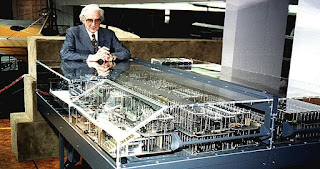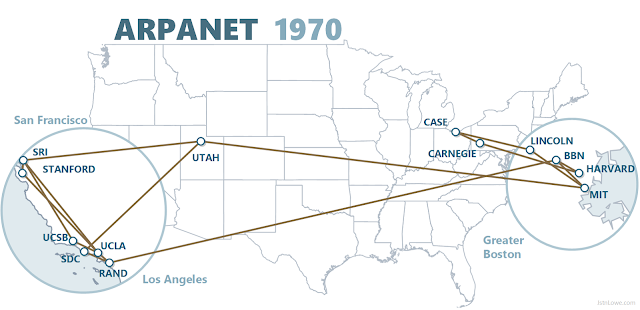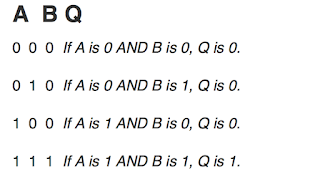Entry 3 - Konrad Zuse: Father of the Computer
Description of Topic
In my first post, I proclaimed Charles Babbage "The Father of COMPUTING." However, holding this title does not also make Babbage the Father of the COMPUTER. Babbage was the first person to create a design for a machine that could engage in some form of computing, but this was not an actual computer, merely an ancestor of what we consider a computer to be today. The first man to complete a fully functional program controlled computer was a man named Konrad Zuse. While some consider Alan Turing to be the true father of the computer ¹, Zuse was the first one to actually create a programmable computer in 1938, so for this blog I will be considering him the Father of The Computer and not Turing.
Zuse's original computer, called the "Z1" was created over the span of two years from 1936 to 1938 in Zuse's parents living room. It was electro-mechanical, meaning that it was a mechanical device (like Babbage's difference engine) that was electrically operated. Despite being large and very limited in its abilities, the Z1 had many of the aspects of the modern computer. It took programming instructions from punched tape (essentially a long metal strip with holes punched in it in order to store data) and was able to output data to the devices memory where the data was stored and could be read in the future. The memory unit was one of Zuse's most brilliant additions to the Z1, a 64 word memory that used a floating point system to store data. In terms of what the Z1 could actually do, it was basically limited to performing addition and subtraction of floating point numbers, with some ability to complete multiplication and division by using repeated additions or subtractions. The machine also used the very same binary system that is used in computers today. Zuse later revised the Z1 into the Z2 and eventually the Z3, which all added new elements to the design including exception handling.⁵
Zuse's contributions to the world of computer science didn't stop with the creation of the first modern computer, he also was able to create the worlds first higher level programming language: Plankalkül. Using this new language, Zuse was able to start drafting the algorithms necessary to create a programmable chess game on his computer, although his designs were never published. Because it was never published, Plankalkül didn't directly lead to other more advanced programming languages, but looking back it is clear that it had many elements of modern programming languages and had it been published it could have been very influential. ²
1: “Alan Turing.” Biography.com, A&E Networks Television, 10 July 2017, www.biography.com/people/alan-turing-9512017.
2: Bauer, F L, and H Wossner. The "Plankalkül" of Konrad Zuse: A Forerunner of Today's Programming Languages, www.catb.org/retro/plankalkuel/.
Zuse's contributions to the world of computer science didn't stop with the creation of the first modern computer, he also was able to create the worlds first higher level programming language: Plankalkül. Using this new language, Zuse was able to start drafting the algorithms necessary to create a programmable chess game on his computer, although his designs were never published. Because it was never published, Plankalkül didn't directly lead to other more advanced programming languages, but looking back it is clear that it had many elements of modern programming languages and had it been published it could have been very influential. ²
Relation to Computer Science
Zuse's influence on the field of computer science is almost immeasurable; he created the first functional computer and programming language, two of the things that are extremely important to modern computer science. Without Zuse and his Z1, who knows how long it could have taken for computers of that level to be developed. The computers that we use every single day are based off of Zuse and his designs, making him one of the most influential computer science pioneers of all time.
References
4: “Plankalkül.” Wikipedia, Wikimedia Foundation, 3 Nov. 2017, en.wikipedia.org/wiki/Plankalk%C3%BCl.
6: “Zuse Z1 Built by Konrad Zuse.” Centre For Computing History, www.computinghistory.org.uk/det/6170/Zuse-Z1-built-by-Konrad-Zuse/.
7: “Z1 (Computer).” Wikipedia, Wikimedia Foundation, 4 Oct. 2017, en.wikipedia.org/wiki/Z1_(computer).
5: “What Is Z1?” Computer Hope, 17 Oct. 2017, www.computerhope.com/jargon/z/z1.htm.



I was actually thinking about this the other day during class. I wondered who the first person was who wrote a compilable program and how hard it must have been to write this without the advanced technology that we have today. Its crazy to think that the Z1 only had the ability to compute very basic mathematical equations and now we have the ability to code extremely complex games and programs. I think Zuse deserves much more recognition for his contribution to the development of advanced computing and computer design.
ReplyDelete